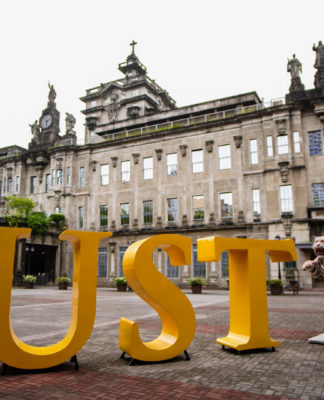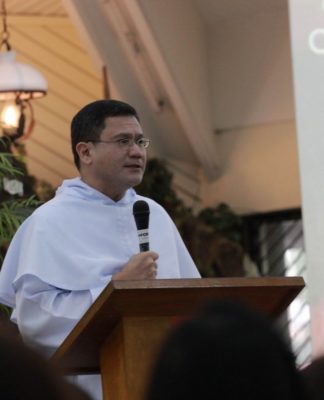MORE than a fellowship of the pen, the Varsitarian’s Inkblots at three has truly become a celebration of the Philippine campus press in the new millennium.
The third installment last Oct. 23 to 25 gathered more than 350 fellows, the largest number to date.
Education Secretary Raul Roco was keynote speaker.
In his speech, Roco stressed that press freedom is a vital element of democracy. Journalists, he added, should always be dedicated to the pursuit of truth.
“Do not be afraid of anything, but be afraid of the fear that you carry within you, because if you carry that fear, you can’t tell the truth. Journalism is a dedication to the truth. You must tell the truth, otherwise get out of journalism,” Roco said.
After the warm welcome, the discourse on the “pursuit of truth” was hammered down even more—through the investigative reporting lecture of Chay Hofileña, a fellow of the Philippine Center for Investigative Journalism.
The respected Ateneo-bred investigative reporter and former Manila Times editor, being among the PCIJ members who exposed the impeachment trial last year, gave easy but systematic tips on muckraking—at least on campus.
On the other hand, Family Today Magazine editor in chief and former Varsitarian editor in chief Peachy Yamsuan spoke on gathering the “truth” through feature writing.
For her, nothing beats the two most important ways of gathering information: research and interview. Writers also should be critical in the information they receive, Yamsuan added. “Not everything that your source said would be gospel truth,” she said.
Ramon Magsaysay laureate Bienvenido Lumbera led the fellows to another exploration of the truth in Philippine culture.
In his lecture on literary criticism, Lumbera deplored “lack of critics in the industry.” Literature and cultural reviews, according to him, are not given enough space in the newspapers today. He also traced this prevalent apathy towards literature to the lack of proficiency of the writers.
The first day was capped by a “Fellowship Night” where the fellows dined and shared their talents in a simple program prepared in the spirit of friendship.
The very long second day started with a lecture on the heart of journalism—Newswriting—with Today editor in chief Lourdes Molina-Fernandez as speaker.
For Fernandez, print journalism did not die with the rise of broadcast media, contrary to popular belief. Journalism and news reportage have remained comprehensive and fair despite the proliferation of multi-media technology and globalization, she said.
For the third time, Tempo’s Nestor Cuartero tackled lifestyle and culture writing. His lecture on the softest side of the newspaper, lifestyle, was as always, glazed with fanfare.
Since Inkblots’ pilot year in 1999, Cuartero’s lecture has always been much awaited, particularly the mock press conference he holds where fellows learn the “art of interviewing.” In 1999 and 2000, respectively, he brought over comedienne Tessie Tomas and singer Regine Velasquez with him to be the interviewees in the mock presscons.
But this year’s presscon was different. Instead of another show-biz personality, Cuartero brought Philippine Star entertainment editor and broadcast personality Ricky Lo.
Lo is very well known for his celebrity interviews here and abroad. Aside from his usual stories, he shared with the amused fellows his own “effective” technique in showing the real face of his interviewees.
“Always come prepared,” Lo said.
On his second year as Inkblots speaker, sports journalist Henson redefined sports as a dramatization of life.
“The audience, especially Filipinos, could easily relate to sporting events, say boxing. In sports, there is conflict, and that is how life works. May inaapi lagi,” he said.
Henson also challenged the fellows to overcome the competition with electronic media and “never to hide the truth and to add value to your writings.”
Famous poet-critic and former National Commissioner for Culture and the Arts executive director Virgilio Almario tackled Filipino Journalism. He gave the audience a good laugh with his exposition on grammatical mistakes in Filipino.
Workshops
This year’s fellowship offered another innovation, parallel workshop sessions with facilitators, all of them practicing journalists.
Workshop facilitators were Inquirer Lifestyle assistant editor and Varsitarian’s publication adviser Prof. Lito Zulueta (editorial writing/copyreading and editing); CBCP Monitor editor in chief Jesselyn Garcia de la Cruz (newswriting); RP Daily Expose art director and Samahang Kartunista ng Pilipinas director Ivan Anthony “Tony” Hirro (principles and application of layouting); Peachy Yamsuan (feature writing), Sports Weekly Magazine contributing editor Richard Dy (Sports Writing); and photojournalist Manuel “Noli” Yamsuan, Jr. (photojournalism).
Later, Zulueta again took the podium to discuss campus paper management. He also distributed his paper “The State of the Philippine Campus Press.” According to Zulueta, campus press freedom should rightly feel worried with the decision of the education department to put on hold the collection of publication fees in elementary and high schools. Another cause for worry is the closure of publications due to the non-collection of publication fees by the school administrations, he added.
He also cautioned against too much politicking.
“I propose that the campus press stop politicizing the issue of press freedom and demonizing the sectors it perceives as stumbling blocks to its flowering…just as I propose school authorities stop pigeonholing the student press as reckless and irresponsible and being onion-skinned and squeamish,” Zulueta said.
Taking time out from his usual tireless writing, National Artist for Literature and former Varsitarian editor in chief, F. Sionil Jose urged journalism to help cure the social ills of Philippine society. “Truth is justice in action, or it is not truth at all,” he said.
Inquirer columnist and Abanse Pinay member Rina Jimenez-David, discussed “gender-sensitive journalism.” The former Varsitarian editor urged a stop to “perpetuation of stereotypes” about sexuality.
Investigative
This year’s fellowship culminated in a dinner which was highlighted by the awarding of the 2001 National Campus Investigative Journalism Awards (NCIJA), established by Washington-based legal editor and former Varsitarian editor in chief Julio Macaranas, Jr., in honor of his late mother, Mercedes Macaranas.
Present during the ceremonies were Commission on Elections Chair and former UST Faculty of Civil professor Alfredo Benipayo and former Presidential Commission on Good Government (PCGG) chief David Castro. PCIJ executive director Sheila Coronel delivered the keynote speech.
The NCIJA board of judges was composed of Manila Bulletin editor and UST Faculty of Arts and Letters professor Ramon Francisco and Macaranas.
There was no winner for this year’s NCIJA. The judges however gave a special prize to the UST Journalism Society’s Angelo de Alban, Jose Guerero Mallari, and Leslie Van Venturanza for their investigative report on fake marriages in the Manila City Hall, published in the society’s newsletter, the Journalese. They received P10,000. Ma. Rowena Gracia T. Alera and Shieryl Lyn S. Moroña

















